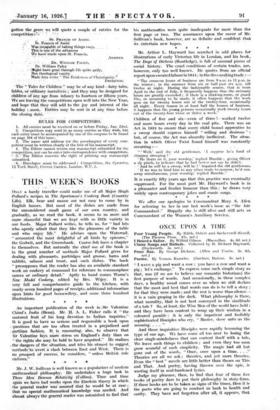Mr. Arthur L. Hayward has searched in odd places for
illtistrations of early Victorian life in LondOn; and his book, The Days- of Dickens (Routledge), is full of unusual pieces of social . history. The cruel conditions of certain trades, are, however, only too well known. He quotes from an official report upon sweated labour in 184t ; in the dressmaking trade :— " The common hours of business are from 8 a.m. to 11 p.m. in the winter ; in the summer from six or half-past six a.m. till twelve at night: During the fashionable season, that is' from April to the end of July, it frequently happens that the ordinary hours are greatly exceeded ; if there is a drawing-room, or grand fête, or mourning to be made, it offerf haPpens that the work goes on for twenty hours out of the twenty-four, occasionally all .night._ ,Every season in at least half the houses of business, it happens that the young persons occasionally work twenty hours out of the twenty-four twice or thrice a week."
Children of five and six—even of three !—worked twelve and more hours every day in the coal pits. There was an Act in 1834 to ensure that every child bound apprentice to a sweep should express himself " willing and desirous " ; but, of course, the Act was absurdly inefficient. The situa- tion in which Oliver Twist found himself was constantly occurring :— .
" Well,' said the old gentleman,. ' I suppose lie's. fond of chimney sweeping ? '
He doats on it, your worship,' replied Bumble ; giving Oliver a sly pinch, to indicate that he had better not say he didn't. ' And. he will be a sweep, will he Y inquired, the old gentleman,: ' If we was to bind him to any other trade to-morrow, he'd run away simultaneous, your worship,' replied Bumble."
It is exactly fifty years ago that this practice was eventually suppressed. For the most part Mr. Hayward's book is in a pleasanter and livelier humour than this ; he draws very widely upon contemporary jokes and comic songs.














































 Previous page
Previous page